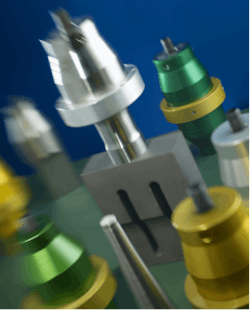Case Study: Emerson’s nimble response to a sudden demand for masks
By Vernon Murray, president, Branson Welding and Assembly at Emerson
Before the pandemic, a major share of personal protective equipment (PPE) such as medical masks and respirators was produced in countries like China, with cost a major factor in product selection and procurement. However, the global spread of COVID-19 suddenly changed the picture: high-quality and, above all, availability became the driving factors in product demand. This sudden shift strained and ultimately reshaped the global supply chain for these products, including everything from the nonwoven, polymer-based materials essential to their construction to the location of the factories containing the assembly and joining technology needed to complete the finished products.
Medical mask production utilizes continuous ultrasonic welds for seams on the width and length of the mask, while the tie straps or elastic ear loops are bonded with plunge or “spot” welds. Image courtesy of Emerson.
The national-security fears associated with the pandemic drove policymakers in many countries—including the US, Germany, and Australia—to develop high-priority programs to domestically manufacture and acquire essential resources ranging from vaccines to medical ventilators to PPE. Medical respirators, such as N95 and FFP2, were desperately needed by medical professionals worldwide, while most of the general public was advised or required to wear surgical-type face masks in their daily activities.
Because Emerson’s Branson ultrasonic plastic-welding technology is widely used in the production of nonwoven PPE like face masks and respirators, we were compelled to adapt to the new normal in PPE manufacturing very, very quickly. In brief, Branson plastic-welding equipment uses high-frequency mechanical vibration to create frictional heat that cuts multiple types of nonwoven fabrics into mask-sized forms, bonds these multiple protective and filtering fabric layers into the form of a mask or respirator, then attaches ear loops, tie straps or adjustable nose pieces to comfortably hold the mask or respirator in place. Often, multiple ultrasonic-welding units must be integrated into larger, automated mask-making machines, so continuous customer interaction is required from early application development and testing to technology integration to final installation, operator training, and startup of the production line.
In the face of the global PPE crisis, Emerson personnel responded to the new normal in several ways: first, they helped existing nonwoven-product manufacturers to refurbish aging or underutilized PPE-manufacturing equipment to bring new capacity online quickly. Second, they worked with machine builders to rapidly equip and automate new mask-making production machines with the latest ultrasonic-welding technology. And third, our personnel collaborated with new-to-the-market players to create and implement innovative PPE-production automation solutions.
Our behind-the-scenes effort was perhaps even more important: the manufacturing team at Emerson Assembly Technologies quickly ramped up production of Branson ultrasonic plastic-welding equipment; this was essential to meet our obligations not only to current customers struggling to increase PPE output but also to a range of new customers when incumbent suppliers were unable to respond due to supply chain limitations or pandemic-related business interruptions.
Ultrasonic assembly systems include boosters and horns that used for bonding nonwoven fabrics into a variety of PPE. Image courtesy of Emerson.
To maximize output, our manufacturing team focused on producing a range of standardized ultrasonic-welding systems and assemblies with the goal of ensuring an uninterrupted supply and the shortest possible delivery times. Fortunately, this incremental production strategy enabled Emerson to supply the hundreds of additional Branson welding units needed to meet new PPE-production demands in every corner of the world.
Our manufacturing strategy was also backed by organization-wide efforts to maintain employee and customer safety (essential to business continuity) in all of our global production, sales and service locations. Our strategy was further supported by an increased emphasis on making distance training, learning and equipment-support tools available in every language.
Emerson’s ability to adapt to the new normal was tested early and often. For example, in March 2020, as Australia’s Department of Defence (ADF) faced the implications of the spreading COVID-19 pandemic, it sought out domestic suppliers to produce the estimated 58 million Level 3 surgical masks the country would need by November 2020. The ADF offered the production contract to Melbourne-based MedCon, Australia’s only domestic supplier of medical face masks. However, due to the influx of low-cost masks from Asia, MedCon’s annual mask production had sunk to just 2 million and just one of its aging mask-making machines remained in production.
To meet the 29-fold increase in mask production, MedCon urgently needed to modernize three older machines and build five new ones. For help, MedCon and the ADF turned to Australia’s premier machine-builder, Foodmach, asking it to complete all eight machines in just 18 weeks, start to finish. Pressed for time, project managers requested Branson ultrasonic-welding technology to equip the four welding stations needed in each mask-making machine and contacted Emerson to request expedited deliveries.
Emerson responded quickly, shipping the first group of welders in just 14 days, with two more shipments to follow. In all, Emerson’s US-based manufacturing facility delivered 34 Branson ultrasonic-welding units, enough to outfit all eight mask-making machines and allow for two welding units as spares. Each unit included a 20 Hz Branson DCX ultrasonic power supply, a matched converter and booster, plus application-specific weld tooling and training, locally produced and supplied by Consonic.
With the help of Emerson’s global supply chain, integration and tooling support, and customer training, Foodmach completed and delivered all mask-making machines to MedCon on schedule. This effort helped put MedCon on track not only to meet its 29-fold production goal in November but also to continue meeting Australia’s long-term PPE requirements amid the worsening global COVID-19 situation.
Conclusion
In times of crisis, every organization is challenged to balance great urgency—the need to adapt to a new normal—with the need for continued focus on key values, vital personal/business relationships, and the long-term planning and effort needed to ensure a bright future. And so, while we at Emerson were able to leverage supply chain, manufacturing and global support capabilities to meet the needs of PPE manufacturers, Emerson, like every global supplier, realizes the importance of building lasting customer relationships.
To be successful, suppliers must be willing to coordinate closely with the customer at every phase—from the idea for a product through successful manufacturing and delivery. Such coordination begins with the ability to respond rapidly to customer inquiries with well-engineered manufacturing equipment, capable of rapidly producing high-quality products. It continues with the willingness to engage in an iterative approach to equipment integration and rapid cycles of testing, analysis and product and process refinement.
Only then, after a fast-paced but thorough assessment has put the “right” product design on the table, can strong supply chains and responsive manufacturing capabilities deliver the final result.


